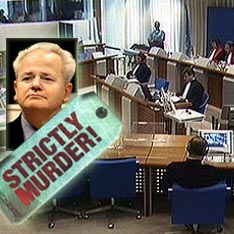SEVASTOPOL DISPATCH

Orange is not the only colour
Russian speakers in Ukraine's Crimean peninsula have helped vote out Viktor Yushchenko, writes Tom Parfitt
Tom Parfitt
Thursday March 30, 2006
Guardian Unlimited
The old man sat alone on a bench clutching a plastic bag. He wore a fake leather jacket and his shoes had been given a new lease of life, not with polish but a coat of brown lacquer that made them twinkle in the sunlight.
His back was straight and he focused his eyes on a faraway point across Sevastopol's deep water bay. "You want to know what we think about the elections?" he said in a steady voice without averting his gaze. "Ask your questions, I'll answer them."
Vadim Polupanov, 68, is a retired merchant seaman. He looked like any other pensioner in the former Soviet Union. Engineers, scientists and teachers; once respected, now eking out survival on a meagre allowance, holding the last scraps of dignity around themselves like a protective shroud.
The usual sloppy tirade seemed likely. No money, no job, no holidays, nothing sure in life any more. But Vadim's complaints were more pointed.
"They are destroying our history, our heritage, our culture," he said. "Yushchenko is an American stooge, a populist. He does everything the US wants. Timoshenko is a liar. I heard she said 'I'll put Sevastopol on its knees'. Imagine that! They want to get rid of us."
He drew breath. "I'm Russian. I was born here. I voted for Yanukovich. He's got a steady grip. He showed it when he was in power. This is a town of Russian glory and it's going to stay that way. Those Ukrainians want to rewrite history and say it's not. Next thing you know, they'll be saying Genghis Khan was Ukrainian. That Yushchenko only wants to give up his country to the West."
It was Sunday March 26, the day of parliamentary elections in Ukraine. The former prime minister, Viktor Yanukovich, had appeared a spent force after he was accused of rigging the 2004 presidential vote that led to the orange revolution. But now his party was predicted to seize the most seats, and went on to do just that.
Mr Yanukovich's opponents, President Viktor Yushchenko and the glamorous Yulia Timoshenko, had fallen out after leading the orange uprising, allowing his comeback.
It seemed a good idea to be in Mr Yanukovich's heartland as votes for him came flooding in. The big, ponderous former governor of the eastern Donetsk region draws his support from the Russian-speaking population in the east and the Crimean peninsula in the south, where Sevastopol is located.
To visit Crimea is to understand the depth of the rift that divides Ukraine. Here, such distant concepts as European integration and Nato accession seem superseded by more perennial concerns: land, freedom, blood and belonging.
A sun-kissed paradise of vineyards and fruit trees that dangles into the Black Sea, Crimea was originally part of Russia. It was transferred to Ukraine by Nikita Khrushchev in 1954 in what was then a minor territorial shift inside the Soviet behemoth. A decade earlier its native population of Crimean Tartars had been deported by Joseph Stalin to Uzbekistan for allegedly cooperating with the Germans during the war.
With the break-up of the Soviet Union, Crimea's mainly Russian population was left stranded in a new country, as was the heroic Russian Black Sea Fleet, anchored in Sevastopol. Old grievances surfaced and new ones quickly emerged.
Today the chief battleground is language. The dispossessed Tartars want back their prime plots of land and support Mr Yushchenko as a result of his promises to help. But the majority Russian population overwhelmingly backs Mr Yanukovich because he has vowed to introduce Russian as a second official language.
Many Russians born and bred in Crimea never needed to learn Ukrainian during the Soviet era, and struggle to understand official documents such as court records. "They're even dubbing our Russian films into Ukrainian," said a disgusted Yevgeny Bubnov, a deputy in the Crimean parliament.
The sense of persecution was not alleviated by a spectacular official cock-up in the run up to the election, which left many disenfranchised. Computer software translated Russian names into Ukrainian ones. Mr Shkvortsov (Mr Starling) became Mr Shpak and could not vote because his passport did not match the electoral roll.
This week, Mr Yushchenko is locked in talks with his former orange allies over a possible coalition to stymie the success of Mr Yanukovich.
One thing is clear in Crimea: if the president wants to be leader of all Ukraine after his party slipped to third place in the election, he must find a way to reach out to the whole country, not just his hardcore supporters.

